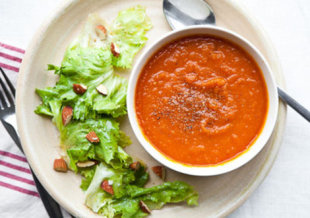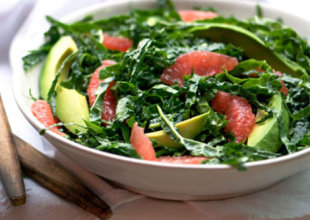Eat, drink, and live longer!
Thursday 23 May 2013
SECRETS FOR A LONG and HEALTHY LIFE
Eat, drink, and live longer!
Thursday 3 January 2013
WAYS TO GET RID OF ALL THAT HOLIDAY BLOATING
The last eight weeks were pretty great, Ah? From Thanksgiving to
Christmas to Hanukkah to New Year's Eve, it seemed like the feasting
would never end, right? Well, now it has. The holiday parties and
cold-weather baking frenzies are over (mostly), and this morning, we
bet, you discovered you couldn't fit into your skinny jeans. (Or maybe
that already happened back in December!) Face it, you're bloated.

Butternut Squash and Tomato Soup
There are, however, ways to stave off the bloat by turning to natural diuretics and anti-inflammatories, according to nutritionist Carolyn Brown of Food Trainers NYC. Many of these can even be woven into what are the heavier wintertime meals you're still probably eating, or can form the basics of a healthful post-holiday diet, keeping you muffin-top-free through January and beyond.
1. Ginger
If after a feast you're feeling a little queasy, ginger can be a fast-acting antacid. It's also an anti-inflammatory, so keep adding it to your stir-fries and marinades. For a refreshing healthy drink, add ginger syrup to to freshly squeezed juices. And no, ginger beer doesn't count. Sorry.
2. Dandelion Greens
These greens, along with nutrient-rich kale, are also a diuretic. Bitter and crisp, they make a perfect addition to any salad and go well with sweet, anti-oxidant rich pomegranate seeds.
3. Apple Cider Vinegar
This fermented juice made from crushed apples is a known bloat fighter and potassium stabilizer. You can either mix it with water, or add it to apples, fennel, and celery for a zippy (and much healthier) slaw. Tip: Use unrefined if you can--refined apple cider vinegar loses a lot of its nutritional value during processing.
4. Turmeric
Turmeric doesn't have much flavor, but it imbues every dish it touches with a warm yellow-orange hue--plus it's high in potassium. Instead of turning to curries, which are often high in fat and sodium, try adding turmeric to whole wheat couscous, rice, or soup.
5. Seaweed
In addition to its diuretic properties, which help to reduce water retention, seaweed makes for a delicious B12-packed snack.They're great crumbled up on salads, soups, and veggies.
6. Basil
Basil is packed with flavo-noids, an antioxidant, and the essential oil extracted from the fragrant herb is an anti-inflammatory. While it's a pesto regular, basil also brightens up salads and vegetable dishes.
7. Mint
While it's most effective when boiled in tea (it helps to flush liquids from your system quicker), mint can also make a great pesto addition. Just don't use it as an excuse to eat mint chocolate chip ice cream cake.
8. Cucumber
Cucumber help to stimulate your kidneys in removing uric acid from your body. Usually taking a back seat to other vegetables in salads, cucumbers are a hit in game-day salsa and as a refreshing topper for raw seafood.

Kale and Pink Grapefruit Salad
9. Red Grapefruit
Along with the antioxidant lycopene and a load of vitamin C to keep away pesky winter colds, grapefruits helps to flush extra water from your system. They also add zip to salads and smoothies (without ice cream).
10. Asparagus
This tender green veg improves kidney function and helps to flush toxins from your body. And when they're pureed, they add a delightful, creamy texture to vegetable soups.
visit yahoo shine for original info

Butternut Squash and Tomato Soup
There are, however, ways to stave off the bloat by turning to natural diuretics and anti-inflammatories, according to nutritionist Carolyn Brown of Food Trainers NYC. Many of these can even be woven into what are the heavier wintertime meals you're still probably eating, or can form the basics of a healthful post-holiday diet, keeping you muffin-top-free through January and beyond.
1. Ginger
If after a feast you're feeling a little queasy, ginger can be a fast-acting antacid. It's also an anti-inflammatory, so keep adding it to your stir-fries and marinades. For a refreshing healthy drink, add ginger syrup to to freshly squeezed juices. And no, ginger beer doesn't count. Sorry.
2. Dandelion Greens
These greens, along with nutrient-rich kale, are also a diuretic. Bitter and crisp, they make a perfect addition to any salad and go well with sweet, anti-oxidant rich pomegranate seeds.
3. Apple Cider Vinegar
This fermented juice made from crushed apples is a known bloat fighter and potassium stabilizer. You can either mix it with water, or add it to apples, fennel, and celery for a zippy (and much healthier) slaw. Tip: Use unrefined if you can--refined apple cider vinegar loses a lot of its nutritional value during processing.
4. Turmeric
Turmeric doesn't have much flavor, but it imbues every dish it touches with a warm yellow-orange hue--plus it's high in potassium. Instead of turning to curries, which are often high in fat and sodium, try adding turmeric to whole wheat couscous, rice, or soup.
5. Seaweed
In addition to its diuretic properties, which help to reduce water retention, seaweed makes for a delicious B12-packed snack.They're great crumbled up on salads, soups, and veggies.
6. Basil
Basil is packed with flavo-noids, an antioxidant, and the essential oil extracted from the fragrant herb is an anti-inflammatory. While it's a pesto regular, basil also brightens up salads and vegetable dishes.
7. Mint
While it's most effective when boiled in tea (it helps to flush liquids from your system quicker), mint can also make a great pesto addition. Just don't use it as an excuse to eat mint chocolate chip ice cream cake.
8. Cucumber
Cucumber help to stimulate your kidneys in removing uric acid from your body. Usually taking a back seat to other vegetables in salads, cucumbers are a hit in game-day salsa and as a refreshing topper for raw seafood.

Kale and Pink Grapefruit Salad
9. Red Grapefruit
Along with the antioxidant lycopene and a load of vitamin C to keep away pesky winter colds, grapefruits helps to flush extra water from your system. They also add zip to salads and smoothies (without ice cream).
10. Asparagus
This tender green veg improves kidney function and helps to flush toxins from your body. And when they're pureed, they add a delightful, creamy texture to vegetable soups.
visit yahoo shine for original info
Subscribe to:
Posts (Atom)












